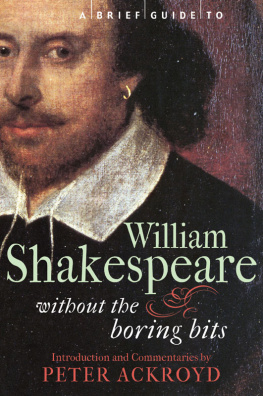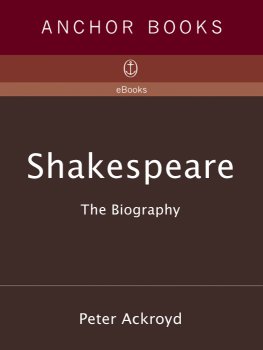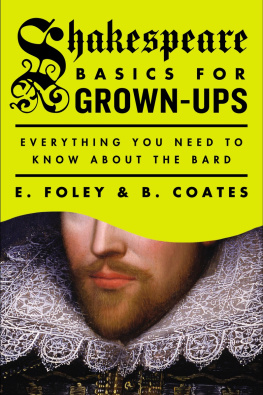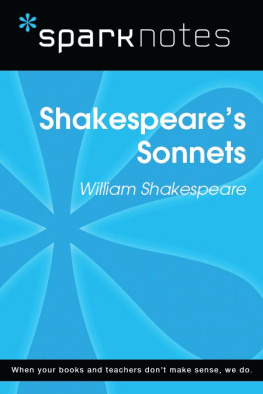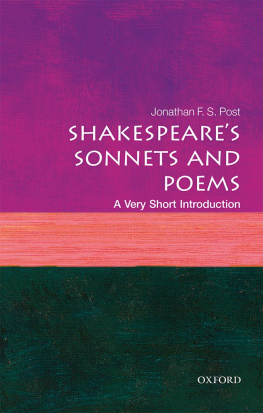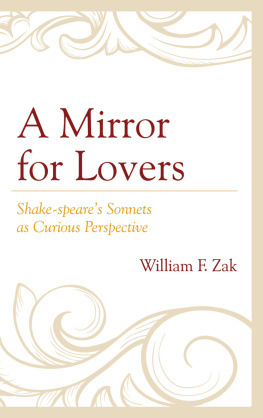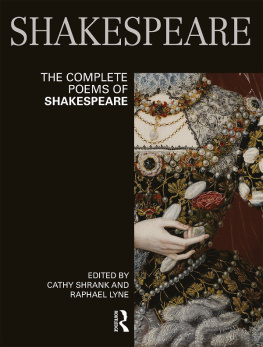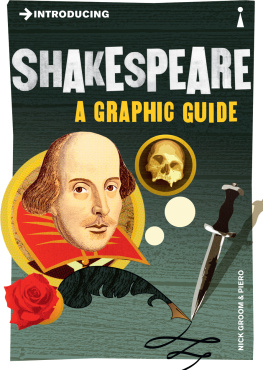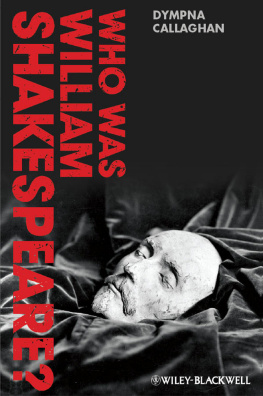A BRIEF GUIDE TO
WILLIAM SHAKESPEARE
Highlights from the series
A Brief History of British Kings & Queens
Mike Ashley
A Brief History of the Crusades
Geoffrey Hindley
A Brief History of the Druids
Peter Berresford Ellis
A Brief History of the Dynasties of China
Bamber Gascoigne
A Brief Guide to the Greek Myths
Stephen Kershaw
A Brief History of Henry VIII
Derek Wilson
A Brief History of the Hundred Years War
Desmond Seward
A Brief History of Life in the Middle Ages
Martyn Whittock
A Brief History of Mankind
Cyril Aydon
A Brief History of the Middle East
Christopher Catherwood
A Brief History of the Private Lives of the Roman Emperors
Anthony Blond
A Brief History of Secret Societies
David V. Barrett
A Brief History of the Universe
J.P. McEvoy
A Brief History of Venice
Elizabeth Horodowich
A Brief History of the Vikings
Jonathan Clements
BRIEF GUIDE TO
WILLIAM SHAKESPEARE
With an Introduction by
PETER ACKROYD
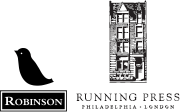
Constable & Robinson Ltd
5556 Russell Square
London WC1B 4HP
www.constablerobinson.com
First published in the UK by Robinson,
an imprint of Constable & Robinson, 2010
Introduction copyright Peter Ackroyd, 2010
All rights reserved. This book is sold subject to the condition that it shall not, by way of trade or otherwise, be lent, re-sold, hired out or otherwise circulated in any form of binding or cover other than that in which it is published and without a similar condition including this condition being imposed on the subsequent purchaser.
A copy of the British Library Cataloguing in Publication Data is available from the British Library
UK ISBN 978-1-84901-048-1
eISBN: 978-1-47210-758-9
1 3 5 7 9 10 8 6 4 2
First published in the United States in 2010
by Running Press Book Publishers
All rights reserved under the Pan-American and International Copyright Conventions
This book may not be reproduced in whole or in part, in any form or by any means, electronic or mechanical, including photocopying, recording, or by any information storage and retrieval system now known or hereafter invented, without written permission from the publisher.
9 8 7 6 5 4 3 2 1
Digit on the right indicates the number of this printing
US Library of Congress Control Number: 2009935111
US ISBN 978-0-7624-3854-9
Running Press Book Publishers
2300 Chestnut Street
Philadelphia, PA 191034371
Visit us on the web!
www.runningpress.com
Printed and bound in the EU
CONTENTS
INTRODUCTION
by Peter Ackroyd
Every day, somewhere in the world, a book is published on the work and life of William Shakespeare. His influence is ubiquitous and pervasive. The phrases and aphorisms of his plays and poems have now entered the general fabric of the English language. That is why, in 2000, he was named as the most significant human being in the previous thousand years of British history. Those who have never read a line of his work consider him to be a token of the national consciousness, an image of the culture that has transcended time. He is quoted endlessly. His plays remain the single largest contribution to contemporary London theatre; they are also filmed and televised at frequent intervals.
Yet he still remains largely unknown and unknowable. The recorded events of his life are not in themselves notable. His features are not known. His religion is unclear. His opinions were never reported. The details of his conversation have not survived. The descriptions of him by his contemporaries are few and impressionistic. So in large part he is a historical enigma. The measure of his invisibility is found in the fact that many other candidates have been put forward as the writer of his plays.
His early life in Stratford, his marriage, and his descent upon London suggest that he was a quick, intelligent and ambitious young man. It has been said that Shakespeare was in some sense uneducated, and that a few years in the local grammar school could not have adequately prepared him for the work ascribed to him. But this kind of snobbery misunderstands the nature of genius; Charles Dickens had far less of a formal education than Shakespeare, but no one has ever doubted the authorship of his novels. Shakespeare had learned enough, and more than enough, to become a lord of language.
He came to London in 1586 or 1587; on his arrival he was twenty-two or twenty-three years old. His first years in the capital are lost in a mist, but the fact that he soon became both an actor and a writer of plays suggests that he had found his true vocation at a very early age. It is likely, in fact, that he came to London in the first place as an aspiring performer. His earliest dramas have no doubt become the victim of time and chance, discarded as soon as they were no longer serviceable; he may have revised some of them at a later date, where they took the form by which we now know them. There may have been very early versions of Hamlet and of King Lear. It is also likely that in these early years he wrote the first drafts of the history plays that became his single most distinctive contribution to the theatre of the 1580s and 1590s. These were plays of battle and of dynastic struggle, composed in a high style of ornate rhetoric.
In the first two years of his residence in London he seems to have composed some six or seven plays. It is important to note that he also acted in them. In the beginning he would have been taught how to sing, to dance and to tumble like an acrobat. He also learned how to fence. He was a young man of the theatre in every sense: energetic and nimble, hard-working almost to the point of exhaustion, and willing to take on any theatrical task he was assigned. He would doctor plays, and write the odd scene or two for other playwrights. An indication of his success is that he was already being attacked by his rivals; the principal charge was that of plagiarism, to which he was undoubtedly prone. His rustic origins were also quoted against him by those who had benefited from education at one of the two universities.
Such was his early fame, however, that with the death of Christopher Marlowe in 1593 he was recognized to be the preeminent playwright in London. This is also the time when we can first begin securely to date and identify his plays. The Two Gentlemen of Verona and The Comedy of Errors are among the earliest of what has become known as the canon. These were hard-edged and Italianate comedies, based firmly on classical originals. But his writing was not confined to drama; his genius was too volatile and too spirited to be restricted to one medium. Throughout 1593 the theatres were closed by the invasive presence of the plague, known at the time as the sickness. So he turned his attention to poetry, and in the summer of that year Venus and Adonis emerged on the stalls of the booksellers.
Only a short while later, upon the reopening of the theatres, Shakespeare joined the Lord Chamberlains Men a band of brothers who represented the most significant force in the English theatre of the time. He was part of this company for the rest of his life. He remained in the acting profession for another twenty years, a longevity that required energy and vitality as well as endurance. He did not perhaps take the major roles; these were generally reserved for his contemporary, Richard Burbage. Theatrical legend over the centuries has claimed that he played the Ghost in
Next page
